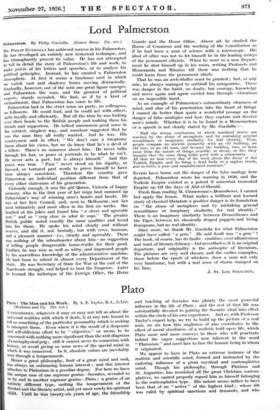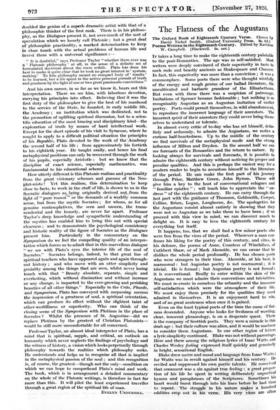Plato
Plato : The Man and his Work., By A. E. Taylor, M.A., D.Litt. (Methuen and Co. 21s. net.) A PHILOSOPHY, whateer it may or may not tell us about the universal realities with which it deals, is at any rate bound to tell us something of the particular personality which is seeking to interpret them. Even where it is the result of a desperate and self-oblivious effort to be " objective," or seems to be 2oneerned with nothing more significant than the arid diagrams of a metaphysical prig ; still it cannot sever its connexion with history, or avoid giving us some news of the special mind in which it was conceived. In it, absolute values are inevitably seen through a temperament.
Hence a great philosophy, fruit of a great mind and soul, has alisys an entrancing human interest ; and this interest attaches to Platonism in a peculiar degree. For here we have the unique case of one supreme genius—Socrates, revealed to In by and in another supreme genius—Plato ; a genius of an entirely different 'type, uniting the temperament of the thinker and the literary artist, and yet most surely his spiritual child. Until he *as twenty-six years of age, the friendship and teaching of Socrates was plainly the most powerful influence in the life of Plato ; and the rest of that life was substantially devoted to putting the Socratic ideal into effect within the circle of his own experience. And as, with Professor Taylor's expert help, we try to build up the picture of a real man, we see how this singleness of aim contributes to the effect of moral sturdiness, of a realistic hold upon life, which Plato more and more conveys to those who will penetrate behind the vague suggestions now inherent in the word " Platonism " and meet face to face the human being in whom it originated.
We appear to have in Plato an extreme instance of the realistic and scientific mind, formed and instructed by the enduring influence of a great mystical and contemplative mind. Though his philosophy, through Plotinus and St. Augustine, has nourished all the great Christian contem- platives, we cannot properly regard him as himself belonging to the contemplative type. His nature seems rather to have been that of an " active " of the highest kind ; whose life was ruled by spiritual - sanctions and demands, and who doubled the genius of a superb dramatic artist with that of a philosophic thinker of the first rank. There is in his philoso- phy, as the Dialogues present it, not over-much of the sort of speculation which we loosely call Platonic ; but a great deal of philosophic practicality, a marked determination to keep in close touch with the actual problems of human life and invest them with a universal significance :—
" It is doubtful," says Professor Taylor "whether there ever was a Platonic philosophy ' at all, in the sense of a definite set of formulated doctrines about the wane scibile. Plato has done his best to make it quite clear that he took no great interest in ' system- making.' To him philosophy meant no compact body of results' to be learned, but a life spent in the active personal pursuit of truth and goodness by the light of one or two great passionate convictions."
And his own career, in so far as we know it, bears out this interpretation. There we see him, with laborious devotion, carrying his principles into effect. Believing that it was the first duty of the philosopher to give the best of his manhood to the service of the State, he founded, in early middle life, the Academy ; an institution which was dedicated, not to the promotion of uplifting spiritual discussion, but to a scien- tific education of the most bracing and disciplinary kind—the exploration of truth by means of hard intellectual work. Except for the short episode of his visit to Syracuse, where he sought to apply to a difficult political situation the principles of his Republic, Plato devoted to the work of the Academy the second half of his life ; from approximately his fortieth to his eightieth year. He taught orally, and hence his final metaphysical positions can only be recovered through the work of his pupils, especially Aristotle : but we know that the discipline of exact science, 'especially mathematics, was fundamental to his educational scheme.
How utterly different is this Platonic realism and practicality from the great visionary schemes and guesses of the Neo- p)atonists Yet this realism, this determination to keep close to facts, to work in the stuff of life, is shown to us in the Socratic dialogues alheing originally derived not, from the light of " pure reason"' or the demands of a worldly common sense, but from the mystic Socrates ; for whom, as for all genuine contemplatives, the seen and unseen, the trans- cendental and the homely, are never far apart. Professor Taylor's deep knowledge and sympathetic understanding of the mystics has enabled him to bring this out with special clearness ; and to demonstrate the psychological consistency and historic reality of the figure of Socrates as the Dialogues present him. Particularly in the commentary on the Symposium do we feel the compelling quality of an interpre- tation which forces us to admit that in this marvellous dialogue " we see with Plato's eyes the interior life of the soul of Socrates." Socrates belongs, indeed, to that great line of spiritual teachers who have appeared again and again through-
out history ; and who move with an utter simplicity and geniality among the things that are seen, whilst never losing touch with that " Beauty absolute, separate, simple and everlasting, which without diminution and without increase or any change, is imparted to the ever-growing and perishing beauties of all other things." Especially in the Crito, Phaedo, and Symposium, Plato has conveyed with surpassing success the impression of a greatness of soul, a spiritual orientation, which can produce its effect without the slightest taint of other-worldliness or superiority. Who can think of the closing scene of the Symposium with Plotinus in the place of Socrates ? Whilst the presence of St. Augustine—did we replace Plotinus by the greatest of Christian Platonists- would be still more uncomfortable for all concerned.
Professor Taylor, an almost ideal interpreter of Plato, has a mind that is spiritual, supple, and critical, an outlook on humanity which never neglects the findings of psychology and the witness of history, a vision which looks perpetually through philosophy towards the realities which philosophy seeks.
He understands and helps us to recognize all that is implied in the metaphysical passion of the soul ; and this recognition is, of course, the greatest—though not the only—condition on which we can hope to comprehend Plato's mind and work. The book, which is in arrangement a detailed commentary on the whole of the Platonic writings, is therefore in fact far more than this. It will pilot the least experienced traveller through a great region of the spiritual life of man.
EVELYN UNDEElnix,.



















































 Previous page
Previous page